 Petzlover
Petzlover Danish Swedish Farmdog is originated from Denmark but Jack Russell Terrier is originated from United Kingdom. Both Danish Swedish Farmdog and Jack Russell Terrier are having almost same height. Both Danish Swedish Farmdog and Jack Russell Terrier are having almost same weight. Both Danish Swedish Farmdog and Jack Russell Terrier has almost same life span. Danish Swedish Farmdog may have less litter size than Jack Russell Terrier. Both Danish Swedish Farmdog and Jack Russell Terrier requires Low Maintenance.
Danish Swedish Farmdog is originated from Denmark but Jack Russell Terrier is originated from United Kingdom. Both Danish Swedish Farmdog and Jack Russell Terrier are having almost same height. Both Danish Swedish Farmdog and Jack Russell Terrier are having almost same weight. Both Danish Swedish Farmdog and Jack Russell Terrier has almost same life span. Danish Swedish Farmdog may have less litter size than Jack Russell Terrier. Both Danish Swedish Farmdog and Jack Russell Terrier requires Low Maintenance.
 The Danish Swedish Farmdog has over the centuries been a versatile dog, working on farms. The history of this dog goes way back to the 1700s, being found in Denmark and Sweden where they originated.
The Danish Swedish Farmdog has over the centuries been a versatile dog, working on farms. The history of this dog goes way back to the 1700s, being found in Denmark and Sweden where they originated.
Today these dogs are also found in other countries. As life changed, the dog’s functions on the farm became less and the dog seemed to disappear somewhat. Both the Danish and Swedish Kennel Clubs worked together to bring back the breed, resulting in the first breed standard in 1987.
The Danish-Swedish Farmdog was also recorded in the American Kennel Club Foundation Stock Services in 2011. Today, most of these dogs are owned as family or companion dogs.
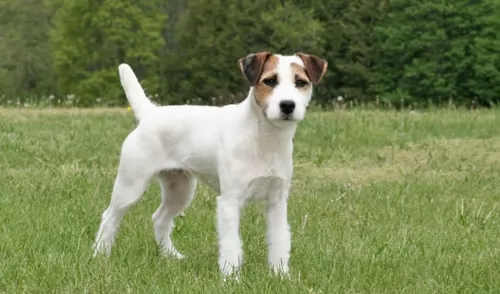 The popular Jack Russell Terrier was developed in Devonshire in the south of England in the late 1800's so as to hunt foxes.
The popular Jack Russell Terrier was developed in Devonshire in the south of England in the late 1800's so as to hunt foxes.
Often believed to be the Parson Russell Terrier, the Jack Russell Terrier was developed by Parson John Russell. This is where the dog gets his breed name from. Some people get the Jack Russell Terrier a little bit mixed up with the Parson Russell terrier, when it fact its actually a different breed, but sharing a common ancestry.
The Jack Russell Terrier is smaller than the Parson and bigger than the Russell Terrier. The breed became known in the U.S. by the 1930s and the Jack Russell Terrier Association of America wanted recognition by the American Kennel Club, which was granted in 2000.
 Nobody could be blamed for thinking that the Danish Swedish Farmdog is a Fox Terrier, because he looks very similar. He also has a short, smooth coat which is odor-free and he is a wonderfully low maintenance breed. The coat does however shed throughout the year.
Nobody could be blamed for thinking that the Danish Swedish Farmdog is a Fox Terrier, because he looks very similar. He also has a short, smooth coat which is odor-free and he is a wonderfully low maintenance breed. The coat does however shed throughout the year.
The coat’s main color is white with patches of black, fawn or chocolate brown. He can also be tri-colored. He is a small to medium sized dog with a compact body, standing between 32 - 37 cm and weighing about 7 – 12kg. He has a deep chest while the head is lean, small and triangular shaped. The ears are semi erect or they can be floppy while the tail is long.
The Danish Swedish Farmdog is not only intelligent, but he has other excellent characteristics that make him such a splendid pet. He isn’t aggressive, he is playful, loving, loyal, social and energetic.
He therefore makes an exceptional pet. He is an amusing pet who will prove to be entertaining too. He loves being part of all the family’s activities and gets on well with children and pets in the home.
You want to be sure that you provide him with exercise and games so that he doesn’t become bored, frustrated and destructive. After all, he is a breed that is used to be busy and he won’t do well with a family who puts him in the back yard and just leaves him.
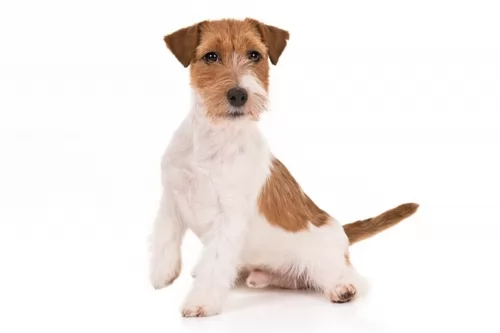 The Jack Russell Terrier is a small dog that weighs between 6 and 8kg and stands at between 25 – 38cm. The body length of the dog should be in proportion to the height.
The Jack Russell Terrier is a small dog that weighs between 6 and 8kg and stands at between 25 – 38cm. The body length of the dog should be in proportion to the height.
He is essentially a white dog with orange or fawn colored patches. The coat is mostly smooth and short, but the coat can also be longer and rough or it can be broken which is a combination of rough and smooth. Regardless of coat type, they are dense, double coats which will require brushing at least twice a week to remove loose hairs. He may also be tri-colored such as being white with black and tan patches.
He has alert, bright dark brown eyes and ears which are somewhat erect and which flop over at the tips. The tail has always been traditionally docked, giving him an attractive, compact look about him but unfortunately the tail is often left long on the dog these days.
Your Jack Russell Terrier is a lively, tenacious, bold, fearless, feisty, cheeky, confident, independent, intelligent and full of life dog. He is super energetic and exuberant, spirited and full of personality.
There are some dog owners who are exhausted by him and would prefer a more quieter dog breed as their companion. Nonetheless he has some excellent characteristics such as being a totally devoted and loving dog.
It is why it is a good idea to have him trained and socialized as it calms him down and makes him more obedient. He is very intelligent and training him will be easy.
 The Danish Swedish Farmdog has got everything going for him that makes him such a wonderful pet to have. He fits well into city- or country life, although wherever you live, you’ll need to ensure he is well exercised.
The Danish Swedish Farmdog has got everything going for him that makes him such a wonderful pet to have. He fits well into city- or country life, although wherever you live, you’ll need to ensure he is well exercised.
He is a child-friendly- and pet-friendly pet and he also happens to be low maintenance. You just need to brush him twice a week. You aren't likely to spend much on vet's fees with him either.In exchange for his love and devotion, make sure that you give every everything he needs to ensure his health and happiness.
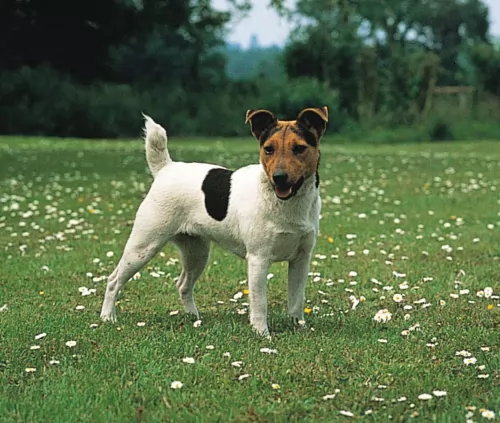 With loads of vibrant personality, the energetic Jack Russell Terrier has got so many wonderful characteristics to his name – devotion, intelligence, charming, lively, playful and he is an entertainer – you’ll always be laughing a him.
With loads of vibrant personality, the energetic Jack Russell Terrier has got so many wonderful characteristics to his name – devotion, intelligence, charming, lively, playful and he is an entertainer – you’ll always be laughing a him.
You do need to pay him attention – you can’t just plonk him in your backyard and forget about him. He wants your love and attention and ignoring him can lead to problem behavior such as obsessive barking.
Give your Jack Russell Terrier all the love and care he needs, and you’ll have an exceptional pet and friend.
 Danish-Swedish Farmdogs have a lifespan ranging from 11 to 15 years. They are hardy dogs, not suffering from any breed specific genetic issues.
Danish-Swedish Farmdogs have a lifespan ranging from 11 to 15 years. They are hardy dogs, not suffering from any breed specific genetic issues.
However, it pays off to know of some of the common dog illnesses there are. If you provide your dog with high quality, nutritious food, good exercise and plenty of love and care, he can reach 15 years of age. Some of the more common dog illnesses to look out for -
It is always a good idea to have this testing for your dog. In fact, hip testing can spare you a great deal of anguish later on with your pet.
Hip dysplasia is a common skeletal disorder in dogs and although it is more prevalent in large dogs, smaller dogs can also get it.
You’ll notice your pet running with a strange gait and sometimes when he lies down, he’ll battle to get up again.
Recognizing the clinical signs of hip dysplasia is important to spare your dog a whole lot of pain, discomfort and even lameness.
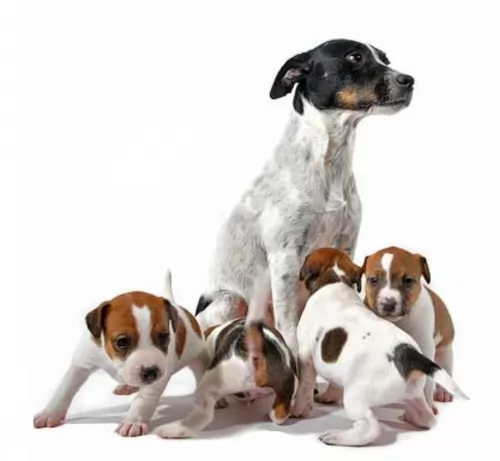 This particular dog breed has a reputation for being healthy and living to a good age such as 16 or 17 years of age. Of course he needs to be given proper care to reach such a good age.
This particular dog breed has a reputation for being healthy and living to a good age such as 16 or 17 years of age. Of course he needs to be given proper care to reach such a good age.
Some common dog disorders you might want to be aware of are -
Lens luxation is actually a common hereditary disorder in these dogs, but even so, with good care, your dog isn’t likely to battle with it. What happens is that the lens in the eye becomes displaced. There are two types, with Posterior luxation being the lesser severe one.Treatment is available.
Patellar luxation is an hereditary disorder affecting the knees of the dog. The kneecap slips off the groove where it sits and you may notice your dog running while holding his hind leg in the air. It can sometimes slip back in place and then you see your dog running in his usual way. It becomes more serious when it affects both legs.
 The Danish Swedish Farmdog isn’t going to be requiring too much grooming. He has a short, smooth coat which actually repels dirt.
The Danish Swedish Farmdog isn’t going to be requiring too much grooming. He has a short, smooth coat which actually repels dirt.
Because his coat is odor-free, he certainly can get by without bathing. This is good news, as bathing a dog strips the skin of its natural oils. You can always just wipe his coat down with a damp cloth to rid it of dust and give his coat a good brushing twice a week to remove it of loose hairs.
It is always a good idea to check your pet’s ears to see that they remain free of debris and wax. There are ways and means to do this, and if you’re not sure how, your vet or doggy parlor can explain the process.
Check his nails to ensure they don’t get too long. This is prone to happen when your pet runs constantly on grass and doesn’t come into contact with a hard surface which files the nails down naturally.
Also, dental care is most important, and you need to brush your pet’s teeth 2 or 3 times a week with special toothpaste and toothbrush designed for dogs. Bad teeth don’t only affect the mouth of the dog, they can be detrimental to every part of your dog’s body.
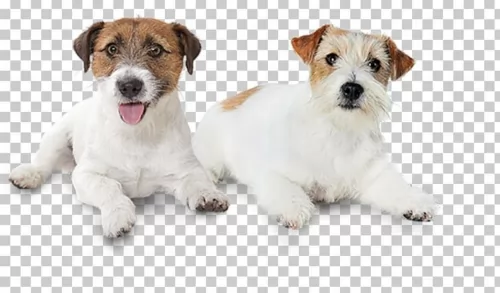 The Jack Russell Terrier isn’t just a small dog that can be left to his own devices. He will need proper training and socialization early in life to make him obedient and better to get on with.
The Jack Russell Terrier isn’t just a small dog that can be left to his own devices. He will need proper training and socialization early in life to make him obedient and better to get on with.
He may be a small dog, but he certainly won’t do in the city where he is cooped up in a place with a handkerchief of a garden. He needs lots of space to run and play. He wants his human family to join in with walks, hikes, ball games and swimming.
You can buy excellent commercially manufactured dog food which caters for energetic small dog breeds like the Jack Russell Terrier.
Once you have selected the best one for your pet, with dry kibble being better in terms of dental health - you can also add in some brown rice, vegetables and cooked chicken. This is highly beneficial to all dog breeds. A little bit of raw meat can sometimes be added in too.
The bottom line is to to prevent your pet from eating foods high in preservatives, additives and fillers. Never leave your pet without a constant supply of fresh, cool water.